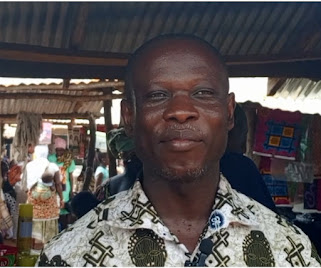Sene East District Health Director, Mr. Bikman Duut Leads Polio Immunization at Kajaji Market.
The Ghana Health Service (GHS) has launched an intensified nationwide polio immunization campaign after the alarming detection of circulating vaccine-derived poliovirus type 2 (cVDPV2) in Koforidua. This heightened response is designed to protect children under the age of five, the most vulnerable group to the poliovirus, from the devastating disease, which can lead to paralysis, disability, and even death. The GHS is committed to ensuring that every eligible child across the country receives the lifesaving polio vaccine.
In
the Bono East Region, the District Director of Health Services for Sene East,
Mr. Bikman Duut, and his dedicated team commenced the campaign at Kajaji
Market, a central hub in the district, where they actively began vaccinating
children on the first day of the program. The market, known for its vibrancy
and large crowds, provided an ideal location for the health workers to access
children and educate caregivers about the importance of the polio vaccine.
Mr.
emphasized the critical nature of the immunization drive. “Polio is a dangerous
disease that has no cure; we can only manage it after infection through
consecutive treatments,” he said, reiterating that prevention through
vaccination is the most effective way to protect children from this
debilitating virus. The detection of cVDPV2 in Koforidua, a city in the Eastern
Region, has raised serious concerns and underlined the need for immediate and
widespread immunization.
In
his address, Mr. Duut elaborated on the severe consequences of poliovirus infections.
“The poliovirus is not something we should take lightly. It can cause permanent
paralysis, disabilities, and even death,” he warned. He explained that children
who contract polio often suffer irreversible damage, particularly to their
muscles, which can prevent them from walking or performing other normal
functions. In more severe cases, the virus can affect muscles responsible for
breathing, which can be fatal.
The
poliovirus poses a significant risk to children, and given its rapid spread and
the lasting damage it can cause, the immunization campaign is seen as an
essential public health intervention. Mr. Duut stressed the urgency of reaching
every eligible child in the district, stating, “This campaign is crucial,
especially after the virus was detected in Koforidua. We cannot afford to
delay. Our goal is to vaccinate every child to prevent this virus from
spreading and harming more children.”
The
Sene East District has set a target to vaccinate over 12,000 children during
the nationwide campaign. Health teams have been deployed across the district to
ensure maximum coverage. Mr. Duut outlined the extensive efforts being made to
reach children in all areas, explaining that some teams are conducting door-to-door
vaccinations, while others are stationed in schools, markets, and other
community gathering points.
“Our
health workers are already in the field, visiting homes, schools, and markets,
making sure that no child is left behind. This is a comprehensive effort to
ensure that all eligible children under five receive the polio vaccine,” Mr.
Duut explained. He expressed confidence that the district would meet its target
through these various approaches and the cooperation of community members.
To
ensure the success of the immunization campaign, Mr. Duut called upon all stakeholders
in the district to actively support the initiative. He urged assemblymen,
opinion leaders, traditional chiefs, and religious leaders to encourage
families in their communities to participate in the vaccination drive. “We need
the full support of our community leaders to spread the word about this
important exercise. Chiefs, religious leaders, and opinion leaders must help us
ensure that children are brought to the designated vaccination points,” he
appealed.
Community
leaders play a vital role in mobilizing the population and ensuring that health
interventions reach everyone, especially in rural and remote areas where access
to healthcare services may be limited. By working together, health workers and
community leaders can maximize the reach of the campaign and protect children
from the potentially deadly consequences of polio.
The
polio immunization campaign in Sene East is part of a broader nationwide effort
by the GHS to prevent the spread of the poliovirus and protect children across
Ghana. Health teams from the GHS are working tirelessly in all regions,
employing a mix of community outreach, mobile vaccination units, and public
health education to ensure that every eligible child is vaccinated. The
nationwide campaign aims to eliminate the risk of further outbreaks and
safeguard the health of the nation’s future generations.
With
the detection of cVDPV2, Ghana is taking proactive measures to prevent the
resurgence of the poliovirus, which had previously been eradicated in many
parts of the world. The re-emergence of the virus in Koforidua is a stark
reminder that high immunization coverage must be maintained to protect children
from preventable diseases like polio.
In
Sene East, Mr. Bikman Duut and his team are leading the charge, mobilizing
health workers and community members alike to prioritize immunization and keep
their children safe. The battle against polio continues, and with sustained
effort and community cooperation, Ghana can succeed in preventing the spread of
this life-threatening virus, ensuring a healthier future for all.



Comments
Post a Comment